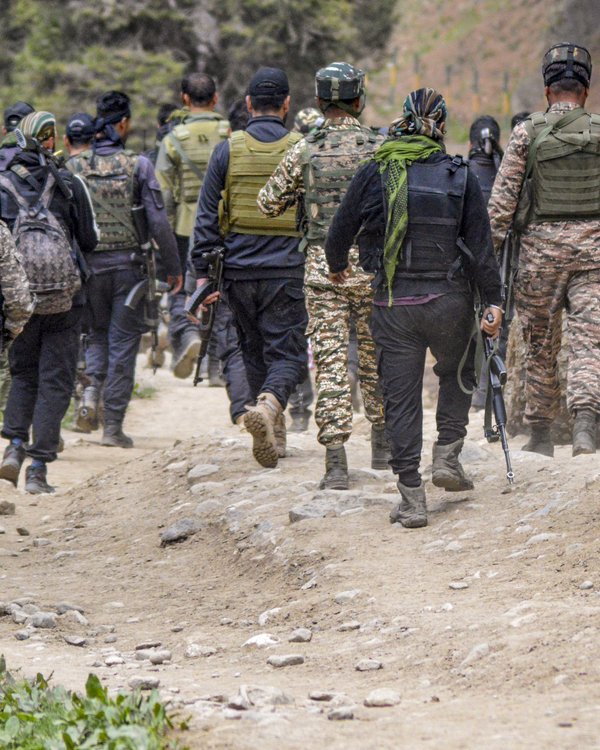
April 28, 2025 | Pahalgam, Jammu and Kashmir

In a devastating attack that has shocked the region and the world, 26 tourists were killed in Pahalgam, a popular resort town in Indian-administered Kashmir, on April 22, 2025. The attack, which Indian authorities have blamed on Pakistan-based militant groups, has led to an alarming escalation of tensions between India and Pakistan — two nuclear-armed rivals.
As the smoke clears in Pahalgam, the political, military, and humanitarian fallout from the attack is only intensifying.
The attack unfolded late in the evening at a riverside resort packed with domestic tourists. Eyewitnesses described scenes of chaos and horror as masked gunmen opened fire indiscriminately. Within minutes, 26 people — many of them families visiting from different Indian states — lay dead. Several others suffered serious injuries.
Survivor accounts suggest the attackers deliberately targeted tourists, avoiding local residents. Some witnesses claimed the attackers shouted slogans before fleeing into the surrounding forests.
Security forces arrived quickly but found the attackers had already vanished, likely taking advantage of the dense terrain. A massive manhunt was launched immediately across Pahalgam and adjoining areas.
Indian intelligence agencies and security officials swiftly pointed the finger at Pakistan-based militant groups, notably those previously implicated in attacks on civilians and soldiers in Kashmir.
However, confusion emerged when a lesser-known group initially claimed responsibility via an online post — only to retract hours later, citing that their communications had been hacked. This has added layers of complexity to the investigation.
Indian Home Minister Amit Shah stated:
“We have clear evidence of external support for this heinous crime. We will expose those responsible at every level and take decisive action.”
The Indian government has not yet released detailed evidence publicly, citing the ongoing investigation.
Meanwhile, Pakistan has categorically denied any involvement. The Pakistani Foreign Ministry called the Indian accusations “baseless” and demanded a neutral, international investigation to establish the truth.
In response to the attack, Indian security forces launched one of the largest crackdowns in Kashmir in recent memory:
More than 500 individuals have been detained across the Kashmir Valley.
Over 1,000 homes, businesses, and wooded areas have been searched.
Demolitions of suspected militant hideouts have been reported, drawing criticism from local human rights groups.
The crackdown has caused widespread fear among civilians, with many Kashmiris expressing concerns over collective punishment and the impact on their daily lives.
“We are mourning the deaths in Pahalgam, but we are also living in fear now. Everyone is being treated as a suspect,” said a local shopkeeper who requested anonymity.
Tensions have spilled over to the military front as well. For four consecutive nights, Indian and Pakistani troops have exchanged small-arms and mortar fire across the Line of Control (LoC), the de facto border dividing Kashmir.
Reports indicate civilian casualties on both sides, although exact figures remain unconfirmed. Military analysts warn that even limited skirmishes could rapidly escalate into a larger conflict if not contained.
Adding to the fears, India conducted test-firings of medium-range missiles two days after the attack, widely interpreted as a show of strength and readiness.
Pakistan has put its border forces on “high alert,” and cross-border trade has come to a complete halt.
The political and diplomatic consequences have been swift and severe:
India suspended the Indus Waters Treaty, a crucial agreement that regulates river water sharing between the two countries.
Indian diplomats were withdrawn from Pakistan, and reciprocal expulsions followed.
Major border crossings were sealed, notably the Attari-Wagah crossing, disrupting people-to-people contact and trade.
Pakistan closed its airspace to Indian civilian flights and suspended visa services for Indian nationals.
These moves have raised alarms internationally, with world leaders urging restraint.
The United Nations, United States, China, and European Union issued statements urging both nations to exercise maximum restraint and to resume dialogue immediately to prevent a broader conflict.
The impact of the Pahalgam attack and the subsequent blame game has reverberated beyond South Asia.
Protests, vigils, and clashes between Indian and Pakistani diaspora groups have been reported in cities like London, New York, Toronto, and Sydney. While some gatherings were peaceful, others descended into violent confrontations, prompting police interventions.
In London, rival protests near the Indian High Commission resulted in multiple arrests after scuffles broke out. Authorities across major cities have since increased monitoring of diaspora events linked to Kashmir.
At the heart of the tragedy are the families of the victims, many of whom had traveled to Pahalgam for vacations they had long planned.
Among the dead were schoolchildren, elderly couples, and newlyweds. The Indian government has announced compensation packages for victims’ families, but for many, the grief is immeasurable.
A survivor, Ritesh Sharma from Uttar Pradesh, recounted:
“One moment we were enjoying the beauty of Kashmir, and the next, I was pulling my wounded wife to safety. I’ll never forget the screams.”
Tourism officials fear that the attack — and the broader insecurity it has triggered — will devastate Kashmir’s tourism industry, a crucial economic lifeline for thousands of local families.
The Pahalgam attack has plunged Kashmir, and the India-Pakistan relationship, into one of their most dangerous moments in recent history.
As both nations stand on the edge of escalation, the international community watches anxiously. Without urgent steps toward de-escalation, diplomacy, and justice, the risk of a broader catastrophe looms large — with consequences that would go far beyond the bloodied valleys of Kashmir.
In the end, the victims of Pahalgam deserve more than retaliation — they deserve truth, accountability, and peace.
